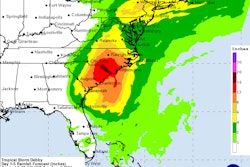Trucking news and briefs for Friday, Aug. 9, 2024:
Port of Oakland small fleet, trucking association rep decry CARB policies
Small fleet owner Bill Aboudi of 10-truck AB Trucking is a supporter of technologies that will lead to cleaner air and a healthier environment. At once,, California regulators, he feels, are getting ahead of reality, mandating the transition to those technologies before they're ready for prime time in many operations.
As reported by Overdrive sister publication Clean Trucking’s Jay Traugott, Aboudi’s fleet operates at the Port of Oakland. Aboudi said that abiding by the California Air Resources Board’s mandates, particularly the Advanced Clean Fleets regulation, currently on hold as the Environmental Protection Agency considers the Clean Air Act waiver that would enable implementation and enforcement, could financially ruin him and many other small fleets and owner-operators in the state and across the country.
Aboudi said that currently, battery-electric and hydrogen fuel cell trucks are not ready for prime time for regional and nationwide hauling. He owns two Orange EV yard tractors that he is satisfied with, however.
"It's a double-edged sword," Aboudi said. "I support zero-emissions but for certain vocations. [Government regulators] are playing with our livelihood when they debate whether BEV or FCEV is better. Teslas are great but that car is not your livelihood, and while Tesla did a great job rolling out the charging infrastructure, we don't have that with trucks."

[Related: Electric trucks don't stand a chance, even in drayage, without more charging infrastructure]
He said he believes CARB doesn’t understand the details of how trucking businesses operate. Trucks come to the port to die because drayage is a hand-me-down industry, he said. Port trucks, compared to regional and national haulers, do not put on many miles. "We don't need to invest a bunch of money in our trucks. A brand-new truck," like what's available today for CARB incentives to purchase in the BEV space, "is a waste."
Unfortunately, he said, CARB officials are ignoring this reality. "Everybody is doing their job description with their blinders on."
Aboudi also claimed that publicly objecting to CARB can lead to problems for owner-operators. "Say something reality-based against CARB and you're done," he said.
CARB responded to his claim that speaking out against the agency’s zero-emission agenda could lead to retaliation:
"All of CARB’s regulations are developed as part of a rigorous and thorough public process, which includes significant engagement from interested parties such as regulated industries and consumers. There is extensive opportunity for public comment during the regulatory process and at each board meeting. As part of the implementation of Advanced Clean Fleets (ACF) there are four Truck Regulation Implementation Groups (TRIG) that meet regularly and also provide a forum for public comment. The feedback collected from fleet owners and operators is critical to the development of our regulations and we continue to engage in outreach during implementation."
Aboudi's not alone in his frustration. "CARB board members are ideologues who are being deferential to the environmentalists. Nobody in trucking is saying ‘let’s pollute the air,'" said Joe Rajkovacz, director of governmental affairs and communications for the Western States Trucking Association (WSTA). "Environmental regulators pretend that nothing has happened in the last 20 years. ... With EPA engine standards, we went to low-sulfur diesel and then ultra-low sulfur diesel, which changed emissions. And the latter required the particulate filter. That was the 2007 engine standard. And in 2010 you had the diesel fluid standard to reduce NOx emissions. Trucking in the last 20 years has spent a fortune to decarbonize."
[Related: EPA 2027 diesel emissions regs: Class 8 truck price hikes in the offing]
CARB, Rajkovacz said, wants nothing to do with fossil fuels, including biodiesel and natural gas. The regulator's "unholy alliance" with the Teamsters doesn't help matters for independents, he added. "What’s in it for labor? The Teamsters have run with a narrative that all owner-operators are abused by the system, whether they realize it or not. The union has also aggressively backed environmentally geared laws."
According to Rajkovacz, the Teamsters Union have argued their case with CARB against independent operators, like Aboudi's small fleet, under the guise that emissions rules should be designed in such a way that encourage only large fleets with employee drivers. More employees, Rajkovacz said, more potential union members. At least two CARB members, he added, supported the position.
Read Traugott’s full report here.
[Related: 'Not gonna be a guinea pig': Owners wary of maintenance unknowns with EPA 2027 emissions]
Roadrunner expanding Canadian LTL service
The Roadrunner fleet is expanding its LTL service to Vancouver, Calgary, Edmonton and the surrounding areas of Canada -- the expansion extends from the carrier's launch of LTL service into Toronto and Montreal earlier this year. The new LTL service into Western Canada will be available for all origin locations that ship freight to Seattle.
Company Chief Operating Officer Tomasz Jamroz said the carrier had fielded numerous customer requests for services to Eastern and Central Canada, to include the West. "We are playing into our strengths in these markets," he said.
Added Ryan Schelb, vice president of network strategy and expansion at Roadrunner, “The service to Western Canada will benefit immensely from having Seattle as our launching point, since our metro-to-metro network is so unique in the LTL world.”
Seattle, the consolidation point for the new service, is among Roadrunner’s strongest terminals, highlighted by its recent win of Season II of the Operations Performance League (OPL) contest, a year-long daily competition among all of Roadrunner’s 40-plus brick-and-mortar locations judged on Key Performance Indicators, or KPIs. These KPIs include more than 20 metrics such as service quality, operational efficiency, loading with care, and data accuracy.
The network expansion further into Canada follows several enhancements from the company, including the creation of Guaranteed Service in select lanes, which offers shippers on-time delivery by the promised date or a full refund of charges, the opening of a new Atlanta service center, and one-day service between its Southern California and Chicago locations.
[Related: Knight-Swift acquires Dependable Highway Express, boosting LTL footprint]
Motive partners with pro golfer to support Navy SEALs
Motive, formerly KeepTruckin, has announced an initiative with PGA Tour pro Jason Day to support the Navy SEAL Foundation (NSF). For every birdie Jason makes on tour, Motive will contribute to NSF to help make sure the families of special operators have someone watching out for them.
“Keeping people safe is core to Motive’s mission, and we see this mission reflected in the work Navy SEAL teams do daily in protecting our country,” said Shoaib Makani, CEO and Founder of Motive. “Navy SEALs and Special Operators take immeasurable risk every day, and we want to invest in the support system they count on at home.”
Fans can contribute to the mission by buying a Jason Day Tour Edition hat on the Malbon website. Malbon is offering these unique hats for sale online only.
“Everyone knows the Navy SEALs, but they don’t know the families that share the courage and commitment they bring to their mission,” Day said. “With Birdies on a Mission, we’re investing in the community that supports our special operators.”








